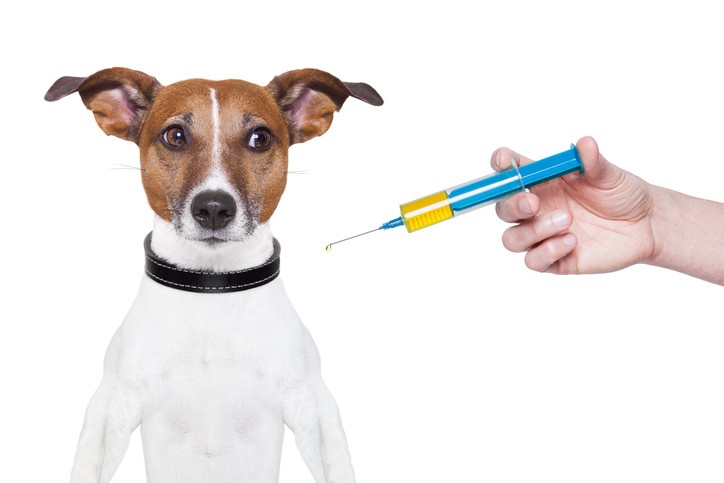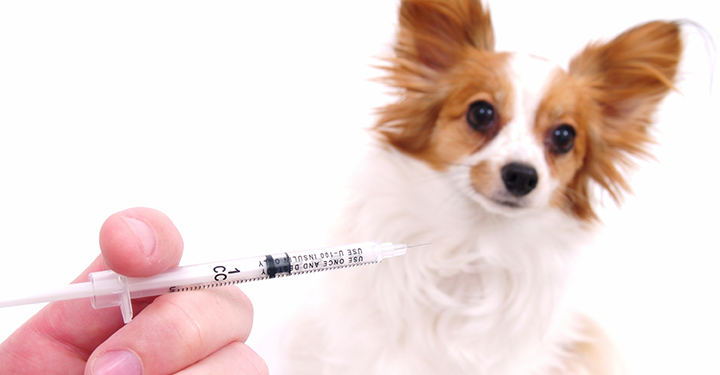
Top 7 Type Of Dog Vaccinations | Rabies, Lyme, Canine & More
Dog Vaccinations are an important part of keeping our dogs healthy, but knowing what they are and which ones are needed can be confusing. Listed below are some of the most common vaccines.

Contents
Type of Dog Vaccinations
1. Rabies Vaccine
The rabies vaccine is a core vaccine and is required for dog vaccinations by law in most states. Individual states regulate how often it is to be given, ranging from yearly to every three years.
It is given to protect humans and pets from being infected by rabies, a deadly virus that attacks the central nervous system. Rabies is usually spread by the bite of an infected animal.
2. Canine Distemper Vaccine (CDV)
Canine Distemper is a systemic virus that is spread through the air and infected body fluids. It first attacks the lymph system and then progresses throughout the respiratory, nervous, and gastrointestinal systems.
To prevent this disease, it is recommended to vaccinate every one to three years, depending on your veterinarian’s recommendation. It is administered in the single-dose shot called DHPP, which contains vaccinations for four diseases including Canine Distemper, Parainfluenza, Parvovirus, and Hepatitis. The “D” is this shot denotes distemper.
3. Parvovirus Vaccine (CPV2)
Canine parvovirus commonly referred to as parvo, is a highly contagious viral disease that is often fatal if left untreated. It is mainly spread through direct or indirect contact from the feces of infected dogs. The virus can live for several months in the ground and on surfaces, such as shoes, toys, floors, and bedding. The parvo vaccine, CPV2, is a core vaccine usually administered in the DHPP shot, as denoted by the first “P”.

4. Canine Hepatitis/Adenovirus Vaccine (CAV-2)
Infectious canine hepatitis is a viral disease caused by the canine adenovirus CAV-1. It can cause respiratory tract infection but it mainly causes damage to a dog’s liver. The CAV-1 vaccine causes severe side effects, so the adenovirus CAV-2 is used instead, which protects against both forms without the side effects. It is considered a core vaccine and is given in the DHPP combination shot, as represented by the “H”.
5. Parainfluenza Vaccine (CPIV)
Canine Parainfluenza is a highly contagious respiratory flu and is the viral form of kennel cough. It is considered a non-core vaccine but is highly recommended. It can be administered in a spray form through the nose or given by injection.
The intranasal form prevents signs of illness, infection, and shedding and is given in combination with the Bordetella vaccine. The injection form prevents clinical illness but not infection or shedding. If given via injection, it is part of the DHPP shot, as denoted by the last “P” in DHPP.
6. Bordetella Vaccine (BB)
Bordetella Bronchiseptica is one of the bacterial forms that can cause kennel cough. The bordetella vaccine does not prevent kennel cough, but it does protect against pneumonia, a common complication.
This dog vaccination is a non-core vaccine according to the American Animal Hospital Association AAHA, but due to the highly contagious nature of kennel cough, most boarding facilities, training classes, and some veterinary clinics do require it. This dog vaccination can be given by injection or in the nasal form with a booster every six to twelve months. The intranasal method is most common.

7. Lyme Disease Vaccine
Lyme disease is an infection caused by the Borrelia burgdorferi bacterium. It is transmitted to humans and dogs through the bite of an infected tick that is attached for at least 24 hours. This dog vaccination is only recommended for dogs in high-risk areas of the United States. When given, it can be added to the combination shot DHPP, which will show as DHLPP in the vet records.
In summary, the recommended core vaccines are for the prevention of rabies, canine distemper, parvovirus, and canine hepatitis. The only dog vaccination required by law is the rabies vaccine.
Of the non-core vaccinations, the parainfluenza and bordetella vaccines are highly recommended due to the highly contagious nature of the diseases. Your veterinarian will help you determine which vaccines are right for your dog
